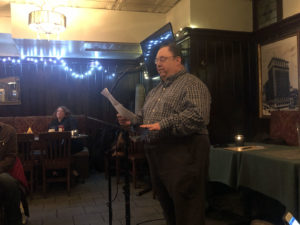I almost quit the book I currently am reading, Anna Quindlin’s Object Lessons. I was excited to start it because I had never read any of her books. My mom had said she liked them. I got hooked on the first paragraph:
“She would never be an imprecise thinker, Maggie Scanlan; she always saw the forest through the trees. It would be most like her to think of that summer as the summer her grandfather had the stroke, or the summer her mother learned to drive, or the summer Helen moved away, or the summer she and Debbie and Bruce and Richard became so beguiled by danger in the broad fields behind Maggie’s down-at-heel old house, or the summer she and Debbie stopped being friends. ”
That’s a hell of a way to start a novel. It got me asking so many questions – did the grandfather survive his stroke? Why did Helen leave? What were they doing in the fields behind Maggie’s house? And why did Maggie and Debbie stop being friends? Add to this that the book takes place in the early 60’s after Kennedy’s assassination, and I was hooked.
But then I was waiting for something to happen. 80 pages in and there still was character development that didn’t answer any of my questions. You learn the background about the Scanlan family. You meet Maggie’s maternal grandfather. But the book was getting close to 100 pages and nothing really happened.
Now, Object Lessons is not a hard book to read. I have finished some books that were difficult get through. While I was going to Hudson Valley Community College, I read Absalom, Absalom by William Faulkner. It’s not an easy read. The sentences are dense and the book is about the guilt the offspring of plantation owners had in owning slaves. For some reason I finished it, but I can’t say I loved it. Another book I slogged through was The Mill on the Floss. It was hard getting past the dialogue written in dialect. I had thought of quitting but forged on until the depressing ending. Another book I found difficult but read all the way through was The Ginger Man. Not only was it a hard book to get through but the main character was a lazy, drunk womanizer. Still, I finished it.
My friend Marge has a rule of thumb that if she’s not into a book by page 100, she quits. I completely understand where she comes from. Why waste time reading a book you don’t like or that seems not to go anywhere?
I have quit some books. I could only get through the 2nd chapter of James Joyce’s Ulysses. I never made it past page 2 of The Sound and The Fury. I read Irving Stone’s The Agony and The Ecstasy to learn about Michelangelo, but it went into too much detail about sculpting.
I am happy to report that Object Lessons finally picked up after page 100. Maggie’s mom is pregnant and refuses to move to a house her father in law bought for her and her husband Tommy. Maggie catches her older cousin Monica on the beach making out with a boy after dark. I’m now on. Page 188 and liking it. I’m glad I pushed on.
Do you have a rule about quitting reading a book? What turns you off about certain books? What books did you give the old heave-ho too? Let me know in the comments.






Before I was a college student (English major), I pretty much gave up on a book if it didn’t grab me in the first few paragraphs. But as a student I did not have that luxury. I am grateful for that as it taught me to be a bit more patient with my reading materials. The Heart of Darkness in particular comes to mind, I probably would have flung it across the room were it not for having to read it for class; I’ve read it twice since. Recently, I began The Hobbit. I accidentally left it at my son’s house midway through, let’s just say I have not been in a rush to get back to it. One hundred pages in is not a bad rule of thumb, some stories are a slow burn or bogged down by more story than seems necessary (Crime and Punishment, which I enjoyed, comes to mind) that doesn’t mean they are not worth the read. I do intend to finish The Hobbit, some day.
I guess some books you don’t mind slugging through. I sympathize over Heart of Darkness, although it’s not a long book.
I had a friend who took a full semester course, and the only book they read and discussed was Ulysses.
I can see studying Ulysses like that. There is so much going on.
It’s always hard to figure out when to stop reading a book. I agree some books are a slow burn but I’d they haven’t sparked your interest, it’s time to give up. I had a hard time with Heart of Darkness. I think Conras’s style puts me off.
I follow this rule that I was told some time ago: take the number 100 and subtract your age; that’s the number of pages you should give a book to grab you.
That makes sense.